7 black composers who changed the course of classical music history
(Classic FM) From Scott Joplin to Florence Price, the music of these brilliant composers has too long been neglected in Western classical music tradition.
In Black History Month, we’re celebrating the most famous and influential black composers in classical music history.
1. Joseph Bologne, Chevalier de Saint-Georges (1745 – 1799)
Dubbed ‘le Mozart noir’ (‘Black Mozart’), the Chevalier de Saint-Georges is remembered as the first classical composer of African origins.
Born to a wealthy plantation owner and his African slave, Saint-Georges was a prolific composer who wrote string quartets, symphonies and concertos in the late 18th century. He also led one of the best orchestras in Europe – Le Concert des Amateurs – and former US president John Adams judged him “the most accomplished man in Europe”. (more)
Statue unveiled for Pulitzer Prize winner and Conroe High graduate
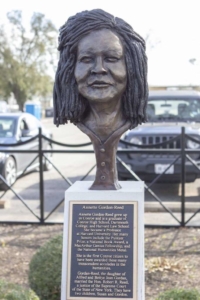 (The Courier) Dave Parsons, 2011 Texas Poet Laureate, is now in the most distinguished of company at Conroe’s Founders Plaza Park.
(The Courier) Dave Parsons, 2011 Texas Poet Laureate, is now in the most distinguished of company at Conroe’s Founders Plaza Park.
After a nearly two-year project, a bronze bust of professor, historian, author and Pulitzer Prize winner Annette Gordon-Reed was unveiled under a sunny spring-like sky Friday afternoon. The sculpture was created by local artist Craig Campobella who has numerous artworks on display in the county.
Her statue is placed next to a statue of Parsons that was unveiled at the park several years ago.
“We at the Montgomery County Literary Arts Council have been thrilled for this historic – and we believe long overdue – recognition,” Parsons told those gathered on Friday.
Councilman Seth Gibson read a proclamation from Conroe Mayor Toby Powell declaring Feb. 15, 2019 as Annette Gordon-Reed Day in Conroe as a part of the ceremony. (more)
Community throws party after Austin pays to save historic black schoolhouse
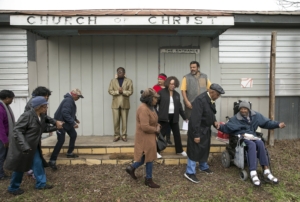 (Austin American-Statesman) Myrtle Robinson started attending the Montopolis Negro School when she was 7 years old.
(Austin American-Statesman) Myrtle Robinson started attending the Montopolis Negro School when she was 7 years old.
Schools were still segregated in the 1940s, and she remembers walking to the one-room schoolhouse with her siblings from their home on Burleson Road. The school had two teachers and about 30 students. Students were served hot meals, and they exercised daily. Next door was the old St. Edwards Baptist Church, where Robinson was baptized; it has since been torn down.
Robinson, now 85, stood Saturday outside the old school building — a staple in the community where she has lived all her life — joined by about a dozen other former students to celebrate the city’s decision last month to purchase the property through eminent domain, a move that saved the old school from demolition.
“I’m very grateful,” Robinson said, surrounded by her former classmates. “If it was gone, it would be like losing a part of me.”
The Jim Crow-era school at 500 Montopolis Drive, which operated from 1935 to 1962, is one of the last surviving structures among 42 rural schools that Travis County operated for black children when Austin schools refused to enroll them. The school initially was built off Bastrop Highway, but a tornado destroyed it in 1935. St. Edwards Baptist Church donated the 1.8 acres of land on Montopolis Drive, where the structure made from old Army barracks sits today, covered by tin and surrounded by weeds. (more)
TIPHC Bookshelf
 Published scholarship on black history in Texas is growing and we’d like to share with you some suggested readings, both current and past, from some of the preeminent history scholars in Texas and beyond. We invite you to take a look at our bookshelf page – including a featured selection – and check back as the list grows. A different selection will be featured each week. We welcome suggestions and reviews. This week, we offer, “Barbara Jordan, American Hero,” by Mary Beth Rogers.
Published scholarship on black history in Texas is growing and we’d like to share with you some suggested readings, both current and past, from some of the preeminent history scholars in Texas and beyond. We invite you to take a look at our bookshelf page – including a featured selection – and check back as the list grows. A different selection will be featured each week. We welcome suggestions and reviews. This week, we offer, “Barbara Jordan, American Hero,” by Mary Beth Rogers.
Barbara Jordan was the first African American to serve in the Texas Senate since Reconstruction, the first black woman elected to Congress from the South, and the first to deliver the keynote address at a national party convention. Yet Jordan herself remained a mystery, a woman so private that even her close friends did not know the name of the illness that debilitated her for two decades until it struck her down at the age of fifty-nine.
In “Barbara Jordan, American Hero,”Mary Beth Rogers deftly explores the forces that shaped the moral character and quiet dignity of this extraordinary woman. She reveals the seeds of Jordan’s trademark stoicism while recapturing the essence of a black woman entering politics just as the civil rights movement exploded across the nation. Celebrating Jordan’s elegance, passion, and patriotism, this illuminating portrayal gives new depth to our understanding of one of the most influential women of our time-a woman whose powerful convictions and flair for oratorical drama changed the political landscape of America’s twentieth century.
This Week in Texas Black History
Feb. 17
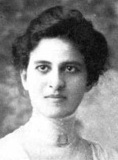 On this date, Maud Cuney-Hare, daughter of prominent Texas Republican Norris Wright Cuney, was born on this day in Galveston. Cuney-Hare became a musician, author/folklorist, and music historian after studying piano at the New England Conservatory of Music. She taught music at the Texas Deaf, Dumb, and Blind Institute for Colored Youths in 1897 and 1898; at the settlement program of the Institutional Church of Chicago during 1900 and 1901; and at Prairie View State College (now Prairie View A&M University), in 1903 and 1904. Her best known work is the groundbreaking book Negro Musicians and Their Music.
On this date, Maud Cuney-Hare, daughter of prominent Texas Republican Norris Wright Cuney, was born on this day in Galveston. Cuney-Hare became a musician, author/folklorist, and music historian after studying piano at the New England Conservatory of Music. She taught music at the Texas Deaf, Dumb, and Blind Institute for Colored Youths in 1897 and 1898; at the settlement program of the Institutional Church of Chicago during 1900 and 1901; and at Prairie View State College (now Prairie View A&M University), in 1903 and 1904. Her best known work is the groundbreaking book Negro Musicians and Their Music.
Feb. 18
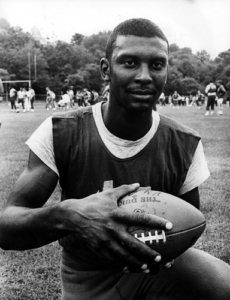 On this day in 1941 sprinter and football player Homer Jones was born in Pittsburg, Tx. Jones attended Texas Southern University and participated in both track and football. He was a member of the 1962 U.S. Track team and clocked 9.4 seconds in the 100-yard dash, .02 behind the great Bob Hayes. Jones was drafted by the Houston Oilers in 1963 but was cut during training camp because of a knee injury, however, he was picked up by the New York Giants. He had a brief, seven-year career, but in 1967 caught 49 passes for 1,209 yards, averaging 24.7 yards per catch, and 13 touchdowns, leading the NFL in receiving touchdowns. For his career, Jones averaged 22.3 yards per catch, leading all receivers with more than 200 receptions.
On this day in 1941 sprinter and football player Homer Jones was born in Pittsburg, Tx. Jones attended Texas Southern University and participated in both track and football. He was a member of the 1962 U.S. Track team and clocked 9.4 seconds in the 100-yard dash, .02 behind the great Bob Hayes. Jones was drafted by the Houston Oilers in 1963 but was cut during training camp because of a knee injury, however, he was picked up by the New York Giants. He had a brief, seven-year career, but in 1967 caught 49 passes for 1,209 yards, averaging 24.7 yards per catch, and 13 touchdowns, leading the NFL in receiving touchdowns. For his career, Jones averaged 22.3 yards per catch, leading all receivers with more than 200 receptions.
Feb. 19
 Most Reverend Curtis J. Guillory became the first black Catholic bishop in Texas on this day in 1988. Guillory, a native of Mallet, Louisiana, was installed as auxiliary bishop of the Catholic Diocese of Galveston-Houston. He became the fifth bishop of the 34-year-old Beaumont Diocese on July 28, 2000 and the first African-American to be bishop of Beaumont – or ordinary of any diocese in Texas, for that matter. His father’s side of the family has been traced back to France. His mother’s side of the family has been traced to the Isle Dominica in the West Indies. He is the oldest of 16 children (six sons, ten daughters).
Most Reverend Curtis J. Guillory became the first black Catholic bishop in Texas on this day in 1988. Guillory, a native of Mallet, Louisiana, was installed as auxiliary bishop of the Catholic Diocese of Galveston-Houston. He became the fifth bishop of the 34-year-old Beaumont Diocese on July 28, 2000 and the first African-American to be bishop of Beaumont – or ordinary of any diocese in Texas, for that matter. His father’s side of the family has been traced back to France. His mother’s side of the family has been traced to the Isle Dominica in the West Indies. He is the oldest of 16 children (six sons, ten daughters).
Feb. 21
 On this day in 1936, Congressman Barbara Jordan was born in Houston. A graduate of Phillis Wheatley High School, Jordan was elected to the U.S. House of Representatives from the Eighteenth Texas District in 1973, becoming the first Black woman from a Southern state to serve in Congress. Jordan received the Presidential Medal of Freedom in 1994, and held the Lyndon Baines Johnson Public Service Professorship at the LBJ School of Public Affairs, University of Texas at Austin.
On this day in 1936, Congressman Barbara Jordan was born in Houston. A graduate of Phillis Wheatley High School, Jordan was elected to the U.S. House of Representatives from the Eighteenth Texas District in 1973, becoming the first Black woman from a Southern state to serve in Congress. Jordan received the Presidential Medal of Freedom in 1994, and held the Lyndon Baines Johnson Public Service Professorship at the LBJ School of Public Affairs, University of Texas at Austin.
Feb. 21
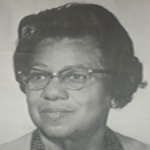 Dolores Burton Linton, educator, was born on this day in 1910 in Seguin. In 1931, Linton converted a former dance hall to hold classes for black children living near San Antonio, but lacking transportation to regularly get to the city to attend school. Linton taught all six grades herself. In 1980, the Northside Independent School District named a new elementary school in her honor.
Dolores Burton Linton, educator, was born on this day in 1910 in Seguin. In 1931, Linton converted a former dance hall to hold classes for black children living near San Antonio, but lacking transportation to regularly get to the city to attend school. Linton taught all six grades herself. In 1980, the Northside Independent School District named a new elementary school in her honor.
Blog: Ron Goodwin, Ph.D., author, PVAMU history professor
Ron Goodwin is an assistant professor of history at Prairie View A&M University. Even though he was a military “brat,” he still considers San Antonio home. Like his father and brother, Ron joined the U.S. Air Force and while enlisted received his undergraduate degree from Texas Lutheran University in Seguin, Texas. After his honorable discharge, he completed graduate degrees from Texas Southern University. Goodwin’s book, Blacks in Houston, is a pictorial history of Houston’s black community. His most recent book, Remembering the Days of Sorrow, examines the institution of slavery in Texas from the perspective of the New Deal’s Slave Narratives.
Recent Posts
The Return of the Silent Majority
Fifty years ago, in January 1969, Richard Nixon was sworn in as the thirty-seventh president of the United States. His legacy as President was marred by the Watergate investigations and his eventual resignation from office which overshadowed the way in which he won the office. His central campaign rhetoric was designed to garner support from white Southerners (otherwise known in history as the “Silent Majority”) whose racial beliefs leaned heavily towards the support of white…(more)
Uncommon integrity
I, (NAME), do solemnly swear (or affirm) that I will support and defend the Constitution of the United States against all enemies, foreign and domestic; that I will bear true faith and allegiance to the same; and that I will obey the orders of the President of the United States and the orders of the officers appointed over me, according to regulations and the Uniform Code of Military Justice. So help me God. — Military Oath…(more)
Submissions wanted
Historians, scholars, students, lend us your…writings. Help us produce the most comprehensive documentation ever undertaken for the African American experience in Texas. We encourage you to contribute items about people, places, events, issues, politics/legislation, sports, entertainment, religion, etc., as general entries or essays. Our documentation is wide-ranging and diverse, and you may research and write about the subject of your interest or, to start, please consult our list of suggested biographical entries and see submission guidelines. However, all topics must be approved by TIPHC editors before beginning your research/writing.
We welcome your questions or comments. Please contact Michael Hurd, Director of TIPHC, at mdhurd@pvamu.edu.
